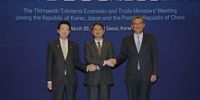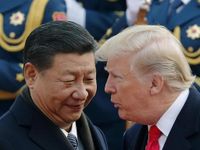In a significant geopolitical shift, China is actively courting Japan and South Korea in response to the U.S. tariff policies initiated under former President Donald Trump. The recent meetings between the economy ministers of Tokyo, Beijing, and Seoul are seen as a strategic move to realign alliances in the face of growing economic tensions.
According to reports, the last ten days have witnessed a flurry of diplomatic activity in Tokyo, culminating in a summit that aims to reduce protectionist barriers just hours before the 'day of Liberation through tariffs' on April 2, 2025. This date marks the implementation of new U.S. tariffs on European goods, with Washington considering universal tariffs of up to 20%. As these tariffs loom, Japan, South Korea, and China are strengthening their economic ties.
Notably, this summit was preceded by a meeting of the foreign ministers of the same three nations, which occurred just a week earlier. The last such meeting between foreign ministers took place in 2023, while the economy ministers had not convened for five years. The recent dialogues have sparked discussions about a potential shift towards a post-American order in East Asia.
Chinese leader Xi Jinping appears intent on exploiting the fears of his neighbors regarding U.S. trade policies, aiming to create a new global order that diminishes American influence. By courting Japan and South Korea, Xi hopes to detach these economically powerful nations from the American sphere of influence.
In a joint statement following the Seoul meeting, the three countries announced their commitment to accelerating negotiations for a trilateral free trade agreement. They also proposed reforms to the World Trade Organization (WTO) to make it more responsive and resilient in addressing current trade challenges. This aligns with China's broader ambition to strengthen the Regional Comprehensive Economic Partnership (RCEP), an agreement established in 2020 involving 15 Asian nations.
The RCEP, which encompasses approximately 2.2 billion people—30% of the global population—has the potential to reshape trade dynamics in the region. However, it notably excludes India, which presents a significant gap in its coverage. Despite the potential of RCEP, it has yet to yield substantial operational agreements or reductions in trade barriers.
China's strategy seems to hinge on capitalizing on the discontent generated by U.S. tariffs, particularly those targeting the automotive sectors of Japan and South Korea. Japanese automobiles alone account for 30% of all goods exported from Japan to the United States, highlighting the stakes involved in these negotiations.
As the April 2 deadline approaches, European stock markets are already feeling the pressure, with declines reported across the board. Wall Street is also starting the week down, reflecting the broader anxieties surrounding the impending tariffs. In response, the European Union is preparing retaliatory measures, including potential restrictions on American companies participating in public contracts and EU funding.
In this context, the collaboration between Japan, South Korea, and China represents a significant shift in regional dynamics. These nations, traditionally aligned with the U.S., are now exploring closer ties in the face of economic pressure from Washington. This move is indicative of a broader strategy to reinforce their economic resilience and counteract U.S. influence.
Furthermore, the threat of tariffs on Russian goods looms large in the absence of a ceasefire in Ukraine, adding another layer of complexity to the global trade landscape. Russian President Vladimir Putin has expressed a willingness to engage in dialogue with Trump, signaling potential shifts in international relations.
As the global economic landscape evolves, the ramifications of these developments will be closely watched. The cooperation between Japan, China, and South Korea could herald a new chapter in East Asian trade relations, one that prioritizes regional collaboration over dependence on U.S. economic policies.
In summary, the recent summits between Japan, South Korea, and China underscore a pivotal moment in international trade relations. With the U.S. tariffs set to take effect, these nations are positioning themselves to navigate the challenges ahead by fostering closer economic ties and exploring alternative trade agreements.
As the situation unfolds, it remains to be seen how effective these strategies will be in countering American economic policies and what long-term implications they will have for global trade.






